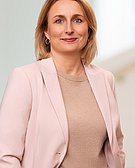eDEM-CONNECT
Development of a communication and service platform for family carers of people with dementia with behaviour-related problems
Project overview
One of the main challenges faced by family carers of people with dementia is how to deal with agitation. This is experienced as a major stress factor and is one of the most common reasons for instability in home care. It is not uncommon for this to result in a move to a residential care facility for the elderly.
The underlying causes of agitated behaviour are manifold: physical, psychosocial and environmental. The complex processes surrounding agitation can only be managed on an individualised basis, which generally requires a high level of counselling and expertise.
The German care system addresses many needs relevant to agitation with its extensive range of support services. However, the information needs of family carers are not adequately addressed in a targeted manner.
In order to ensure the stability of the care arrangement and to make it easier to deal with agitated behaviour and dementia, various support approaches are required, which are constantly changing due to the progressive course of dementia.
Objective
In the spirit of active participation, a chatbot-based communication and service platform for dealing with agitation from people with dementia and for promoting aspects of stability in home care was developed with family carers, which is experienced as useful by family members in everyday life. Individualised, needs-based information, coping and handling strategies and support services were provided.
Sub-project of the UW/H
The Chair of Nursing Science at the UW/H provided the dementia-specific domain knowledge for agitation, was responsible for the user-centred development process (carers and experts) and carried out the evaluation in the field together with the DZNE Witten. The Junior Professorship of Innovative and Digital Teaching and Learning Methods in Multi-Professional Health Care at the UW/H was responsible for the target group-appropriate, didactic preparation of the content for the platform. The UW/H was also responsible for project coordination. This included, in particular, monitoring the overall work plan and schedule, ensuring internal communication within the network, organising network meetings and advisory board meetings and coordinating public relations work.
Milestones
- Evaluation phase with the help of usability tests to determine not only usability and other aspects but also acceptance, frequency, duration of use and awareness/need for information
- Involvement of carers in the development of technology to record the requirements of the application
- Ontology development with a focus on agitation and stability
- Further development of the ontology with experts and family carers
- Didactic target group analysis
- Creation of a didactic concept
- Meetings of the project and relatives' advisory board
- Collaboration on the development of the use case as the basis for the project
- Scoping workshop (Ergosign GmbH): Contribution of expert knowledge to the target group and the care situation in the home
- Support and participation in the YOUSE GmbH stakeholder workshop
- Support and participation in the MEESTAR ethics workshop, which was coordinated by the Protestant University of Nuremberg
Further information
- Duration: 02/2020 - 07/2023
- Responsible: Chair of Nursing Science
- Project team members: Junior Professor Dr Daniela Schmitz, Dr Christiane Pinkert, Franziska Anushi Jagoda, Britta Becker, Rosalie Heimke (04/2020 - 02/2022), Deliah Katzmarzyk (03/2022 - 01/2023)
- Project partners: Fraunhofer ISST, German Centre for Neurodegenerative Diseases - DZNE, Witten site (DZNE), Chair of Mobile Multimedia Information Systems at the University of Rostock, Institute for Nursing Research, Gerontology and Ethics at the Protestant University of Nuremberg, Ergosign GmbH, YOUSE GmbH
- The project profile can be viewed on the BMBF website.
Project-related publications
Article
- Schmitz, D.; Becker, B. & Schütz, K. (2021). Focus on family carers of people with dementia as learners. Nursing Science, 5 (23), 340-346. https://doi.org/10.3936/11983
Congress contributions and presentations
- Hochgraeber, I., Pinkert, C., Suravee, S., Stefan, L., Halek, M., & Holle, B. (2021). Science-based ontology development as a basis for AI-based counselling of family caregivers. Insights into the eDEM-CONNECT project. 20th German Congress for Health Care Research, Online
- Scientific poster: "Family carers of people with dementia as learners: A literature-based target group analysis on learning situation, learning interest and learning habits in the context of digital media (Schmitz, Schütz & Becker, 2022)
- Scientific poster: "Domain knowledge for the development of an ontology for dealing with agitation in people with dementia - The eDEM-CONNECT project" (Pinkert, et al.,2022)
Contact us

Univ.-Prof. Dr.
Margareta Halek
Chair holder
Faculty of Health (School of Nursing Science) | Chair of Nursing Science
Alfred-Herrhausen-Straße 50
58455 WittenRoom number: C-1.197A / C-2.360